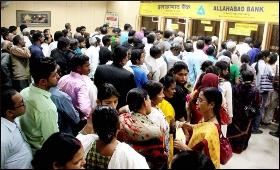|
|
|

|
Demonetisation paralysed businesses, says ex-banker Meera Sanyal
|
|

|
|
| Top Stories |
 |
|
|
|
SME Times News Bureau | 09 Nov, 2018
Former banker Meera H. Sanyal in her book launched on second anniversary
of the move to nullify high denomination currency, says demonetisation
"paralysed businesses" in the country.
Sanyal, a former CEO and
Chairperson of Royal Bank of Scotland in India and currently a member of
the National Executive Committee of the Aam Aadmi Party, in a chapter
named "The Economic Shock" of her book, says: "Instead of taking much
needed steps to make it easier to do business in India, the government
paralysed businesses with the chaotic demonetization."
She also described the decision as a "totally unnecessary step which extracted a very high cost".
The
Big Reverse: How Demonetization Knocked India Out -- brought out by
Haper Collins India -- hit the stores on November 8, 2018.
Following is the second part of the extract from the book:
The
famous Chinese philosopher Lao Tzu is reputed to have said: 'Governing a
great nation is like cooking a small fish - too much handling will
spoil it.'
The economic impact of demonetization shows the truth
of this statement. It was a totally unnecessary step which extracted a
very high cost.
Instead of taking much needed steps to make it
easier to do business in India, the government paralysed businesses with
the chaotic demonetization.
The experience of Malti, my
micro-entrepreneur fishmonger friend, was multiplied millions of times
across the economy. As cash was sucked out of the system, individuals
started losing their jobs, faced losses in their farms, and had to shut
down businesses, howsoever tiny. They became increasingly more fearful
of the future, and in an attempt to conserve cash and preserve savings,
they and their families reduced consumption.
As demand fell and
people started to buy less, firms cut back on production, which led to
lower capacity utilization. Confronted with falling demand and
overcapacity, business people in the private sector postponed or reduced
their investment plans.
Unwittingly or otherwise, the architects
of India's 2016 demonetization had accelerated the downward spiral in
investment in the formal sector, mortally wounded those in the
agriculture and informal sectors, caused innumerable job losses, and
seriously impacted GDP growth.
As The Economist had pointed out:
'India's "Demonetization" is a cautionary tale of the reckless misuse of
one of the most potent of policy tools: control over an economy's
money... Managing an economy's money is among the most important tasks
of the government. Clumsy use of monetary instruments comes with high
risk.'
By not recognizing this risk, the NDA government caused a
reasonably well-functioning economy to stop dead in its tracks. By not
acknowledging the damage they had caused, and hiding behind a maze of
confusing data, the government compounded the demonetization error.
Since
they refused to admit the blow that the economy had suffered due to
demonetization and remained in complete denial, they also could not take
corrective actions to revive the economy. This state of denial,
therefore, compounded one error with another, leading to a much slower
recovery than would otherwise have been possible.
|
|
|
| |
|
|
|
|
|
|
|
|
|
|
|
|
|
|
| |
| Customs Exchange Rates |
| Currency |
Import |
Export |
US Dollar
|
84.35
|
82.60 |
UK Pound
|
106.35
|
102.90 |
Euro
|
92.50
|
89.35 |
| Japanese
Yen |
55.05 |
53.40 |
| As on 12 Oct, 2024 |
|
|
| Daily Poll |
 |
 |
| Do you think Indian businesses will be negatively affected by Trump's America First Policy? |
|
|
|
|
|
| Commented Stories |
 |
|
|
|
|
|
| |
|